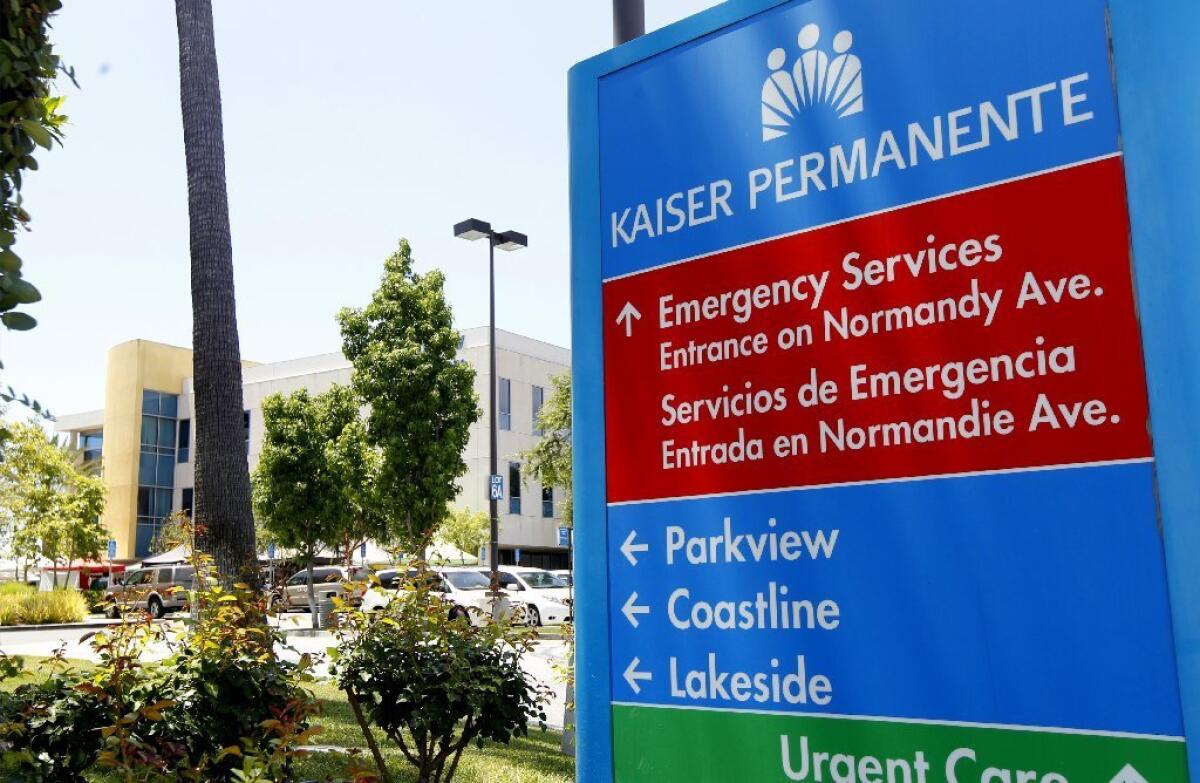HMO giant Kaiser Permanente plans to open a medical school in Southern California

Oakland-based Kaiser Permanente wants to open a School of Medicine in Southern California by the fall of 2019.
HMO giant Kaiser Permanente plans to launch a medical school in Southern California, bucking the healthcare establishment and promoting a new generation of physicians that looks more like the community it serves.
The nonprofit health system said Thursday that it hasn’t selected a site for the Kaiser Permanente School of Medicine, which would enroll its first class in 2019. Many aspects of the plan, including its price tag and campus size, haven’t been finalized.
But the Oakland company said that its approach will differ markedly from that of many established medical schools. It will hew closer to the company’s commitment of rapidly adopting new technology and adhering to the latest medical evidence in patient care.
The unorthodox move illustrates the lofty ambitions of Kaiser’s chairman and chief executive, Bernard Tyson. He strongly believes that Kaiser’s model of coordinated care is the answer for what ails the U.S medical system. Teaching that approach to young doctors could accelerate change across the country, he said.
“We have the opportunity to help train future physicians on 21st century medicine and be on the cutting edge of all the changes we are experiencing,” Tyson said. “Our model of care is best for the current and future diverse populations in this country.”
Tyson said he explored the possibility of partnering with existing medical schools or universities and opted instead to build from scratch.
In some ways, the move extends what Kaiser already has been doing — it has about 600 physicians completing residency programs now and several thousand more do some of their training at Kaiser each year.
Kaiser studied North Shore-LIJ Healthy System’s medical school in Long Island, N.Y., which accepted its first class only four years ago. The school, affiliated with Hofstra University, diverges from the traditional model of two years of classroom study followed by two years of clinical training, said Michael Dowling, the school’s president and chief executive, who advised Kaiser on its plan. Incoming students are immediately sent out to train as emergency medical technicians on ambulances, for example.
“It’s not a cloistered kind of arrangement where they spend time in the classroom memorizing things,” Dowling said. “They’re actually out in the field doing things, which we believe is the best way to learn.”
Newer medical schools have increasingly shifted toward more hands-on training, Dowling said. “It’s all about the move toward population health and it’s all about teamwork. … The whole philosophy and culture is quite different,” he said.
Maintaining the health of a large group of people is fundamental to Kaiser. It collects an upfront premium from customers to cover all of their care and has an incentive to keep patients healthy as opposed to the conventional fee-for-service model that can trigger wasteful spending.
Unlike most health insurers, Kaiser runs 38 hospitals across the country, owns hundreds of clinics and has nearly 18,000 doctors on salary at its affiliated medical groups. Kaiser operates in eight states and the District of Columbia, but nearly 80% of its 10.2 million members are in California.
Kaiser said medical education has been slow to move away from an approach centered on facilities and services, and hasn’t evolved fast enough to meet patients’ reliance on mobile technology to manage their busy lives. Kaiser has been a leader nationally at adopting electronic medical records and offering doctor visits online.
Diversity was another motivating factor behind Kaiser’s decision. It wants to recruit more minority students and teach all doctors how to better care for an increasingly diverse patient population.
“We anticipate them going out into the communities and spending time with patients in the communities from which they come,” said Dr. Edward Ellison, executive medical director of the Southern California Permanente Medical Group.
Kaiser will face tough competition from more established and better-known medical schools in pursuit of top students and faculty nationwide — including major facilities such as USC and UCLA, and a new school at UC Riverside, which opened in 2013.
Sean Pianka, 24, a first-year medical student at UCLA who has had healthcare through the Kaiser system, said the company’s approach is “very efficient,” but added that he had some reservations about “a school run by a company like Kaiser. That sounds a little strange.”
Tuition will be competitive with other medical schools and financial aid will be provided to help “disadvantaged students,” according to Kaiser. The first class of about 50 students should start in fall 2019, and enrollment will grow after that, Kaiser said.
Tyson said he was scouting for locations across Southern California but declined to be more specific. Some health-policy experts were surprised by Kaiser’s announcement, but they said a medical school could help fill the company’s own workforce needs as it continues to grow.
Kaiser will be creating a steady supply of physicians it can hire, though its graduates won’t be under any obligation to work for Kaiser.
“Kaiser is clearly making a statement that they want to train doctors in their culture, philosophy and way of delivering care,” said Steve Valentine, vice president and West Coast consulting leader at healthcare firm Premier Inc. “It won’t be a fit for some students. They will still want UCLA, USC, Johns Hopkins.”
Critics worry a Kaiser medical school might emphasize controlling costs, to the detriment of patient care.
Some Kaiser patients feel the care they want is limited by the HMO’s system. Last year, the company paid a $4-million fine imposed by California regulators related to inadequate treatment of mental health patients.
Outside experts, Medicare officials and patient safety advocates routinely give Kaiser high marks for its preventive care and overall performance. Policymakers hold up the company as a model for how it coordinates care across its hospitals and physician offices.
Kaiser’s annual revenue was $56.4 billion last year, with an operating income of $2.2 billion. The company said this month that it was spending $1.8 billion to acquire Group Health Cooperative, a nonprofit insurer in Washington state.
chad.terhune@latimes.com
geoffrey.mohan@latimes.com
Times staff writer Ron White contributed to this report.







